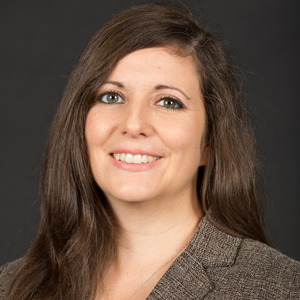10 tips to get you through your Ph.D. program
Graduate school can be a grueling, sometimes thankless endeavor with a tremendous, career-determining goal. The pressure to succeed, get your project to work, get enough sleep and find all of the free pizza can be overwhelming, so it helps to have a support network and advice from experienced former grad students. All of us who have survived graduate school and come out the other end with a Ph.D. share a bond. In that spirit, here’s some advice that I hope will help you get through. In no particular order:
1) You are your own best advocate.
You know yourself best. Your very busy principal investigator may not be as attuned to your progress as you are. Keep pushing yourself forward — your results, possible publications and any opportunity that comes your way for conference travel, funds and the like.
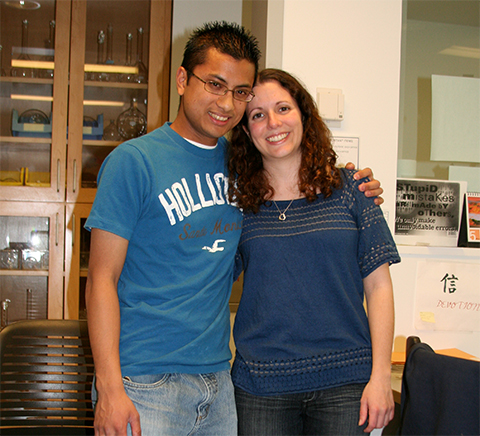
When it comes to your mental health and life balance, you need to advocate for that, as well. Believe in yourself.
2) Difficulty is opportunity.
Albert Einstein said, “In the middle of difficulty lies opportunity.” Your science will fail. In all projects, unexpected results and things not going as planned are part of the process. We all know the effort and care we put into our projects and how frustrating and demoralizing it feels when something new doesn’t work out. However, with failure comes a fresh start, a new chance.
Take each setback as an opportunity to spin your wheels, think a bit further, and, often, you will come to some new discovery. When you’re failing, it’s hard to hold onto such advice. My mother once sent me a pick-me-up card with Einstein’s quote, and she wrote, “Remember this as you go through procedure after procedure — never giving up. It’s a tough journey but one, we doubt, you’ll ever be regretful for — continue and may successes come to you and your project — in small doses or big ones.”
3) Don’t take it personally.
You’re a cog in a very large wheel that involves your university, your PI, your department colleagues and possibly other departments or schools, a funding agency and your field as a whole. Whether your project works according to plan, stagnates, opens different doors or fails is mostly a matter of chance and the science itself. Your hard work may feel like it never pays off, but that is just part of the process of working toward a goal.
Your self-worth is more important than your project. Whether you achieve 20 publications or one, whether everything works immediately for you or you slog through years of turmoil, it has nothing to do with how great a scientist you are. You are there, you are achieving your goal of working towards a Ph.D. and you are worthy of being celebrated.
4) Find outlets.
You may not feel like you have time for hobbies or much of a life outside the lab, but sometimes taking time away helps you make more sense of your project or clear your brain — or just improves your wellness, mental health and relaxation. It can be as small as getting together with friends for a game night or learning to cook a new dish or as large as joining a sports team, class, group or musical endeavor. Looking forward to an activity that taps into the other parts of your identity can help you feel more confident and energized for your tasks in the lab. You can connect with yourself and maybe discover new avenues of creativity.
5) Imposter syndrome is real …
With all of the internal and external stress of graduate school, with so much riding on an unpredictable project, we all sometimes feel like we don’t belong. Fellow grad students likely share but may not show these feelings, so it’s easy to feel you made a mistake or don’t fit in. You may have thoughts like “everyone else is better than me” and “I have no business going for a Ph.D. — who do I think I am?”
First, you are not alone. Just about every grad student goes through some version of this, even the most apparently successful ones. When you put a lot of effort into something that has a very slow payoff, it can be easy to feel you are the problem. You are not. Simply being there, surviving, pursuing and committing means you belong. You’ve come this far; as you continue, have faith in yourself.
6) … but know your limits.
Whether it’s sleeping in on a Saturday (even when your PI demands you be in the lab), going home to eat dinner and watch TV instead of heading back to the lab one night, or using whatever vacation time you’re given, every high-achieving, Ph.D.-pursuing student reaches a point where they realize they need to find a boundary. Your mental health and wellness are key to your success.
And you might realize that graduate school is no longer for you — not as a form of imposter syndrome but truly, on a deep level, you do not want to continue. My PI once told me that part of graduate education is knowing when a project needs to be abandoned. Knowing if you need to abandon the program is also key.
7) Grad school, like life, is not a silo.
Find support and appreciate your support people. When my physical and mental health deteriorated in graduate school, I knew I needed to pursue not just medical testing for my myriad gastrointestinal issues but also counseling. This is not a defeat. We all need support, in some form, and when pushing yourself through graduate school you may need extra support. Counseling empowered me, and I was able to complete my time on a high note.
Look for the unsung heroes within your department — from the facilities managers to the office staff — the people who quietly make everything run smoothly but are often overlooked.
I’m only 5 feet tall. One day a building carpenter noticed I was perched precariously on a wobbly stool to run a flash column in my hood. He built me a sturdy box to stand on (which I passed on to my vertically challenged lab mates upon my graduation). I will never forget his kindness and initiative. Sometimes, the little things keep you going.
8) Slow and steady wins the race.
Good things truly do come to those who wait. Pursuing a Ph.D. is a marathon, not a sprint. Some projects take years to come to fruition, and each year can merge into the next until you feel like it will never end. Perseverance is key, and you will be tested. Even the most prolific, high-achieving graduate students take years to reach the prize. Each person’s story is as unique as is their project; do not fall into despair comparing yourself to others — you will get there in your time.
9) Find the free food.
Most Ph.D. students are paid a stipend, but life can be expensive. A perk of graduate programs is the opportunity to meet high-level speakers and attend workshops and networking events. These often include free food. Whether it’s an all-day conference with breakfast, lunch, dinner and coffee breaks or a one-off free lunch with the speaker, graduate school will feed you if you put in a bit of effort.
I once saw a fellow grad student stuff his pants pockets, jacket and backpack full of free cans of soda at an event; in the end, he was so heavily laden I’m not sure how he climbed the stairs back to the lab. My record was four straight days of free pizza from a marathon of talks and meetings. Most event organizers know: If you feed them, they will come.
10) Make the most of the time, and keep an open mind.
Grad school is just one snippet of your life. Someday you’ll look back at all you accomplished and the people you bonded with. You’ll think fondly of eating takeout in the lab spaces at night, waiting for your cells to grow. The first time I stayed late in the lab, I felt like I’d joined some nerdy fraternity. We talked all night about science and our lives.
I finally felt like I found a home as a graduate student. Over the years, I met people I was inspired by — like the postdoc who became a professor at a small primarily undergraduate college, which I then realized was my aspiration — and some I’ve come to love.
My husband of 11 years worked at the bench across from mine, and his desk was feet behind mine in our office. Through graduate school, we bonded, laughed, argued, competed for our PI’s approval, cried, cheered each other up and, in the end, became the best of friends while falling in love. We come from different parts of the country, different backgrounds, different races and different experiences, and yet grad school was our union, the level playing field where we flourished and became close.
I think I succeeded in my Ph.D., both academically and personally, by keeping an open mind. So, go forward and be true to yourself. Remember, those of us who have been through it are here for you every step of the way.
Enjoy reading ASBMB Today?
Become a member to receive the print edition four times a year and the digital edition monthly.
Learn moreGet the latest from ASBMB Today
Enter your email address, and we’ll send you a weekly email with recent articles, interviews and more.
Latest in Education
Education highlights or most popular articles
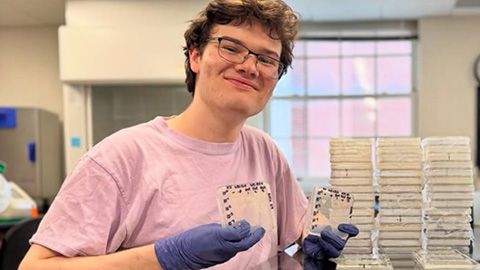
Summer research spotlight
The 2025 Undergraduate Research Award recipients share results and insights from their lab experiences.

Debugging my code and teaching with ChatGPT
AI tools like ChatGPT have changed the way an assistant professor teaches and does research. But, he asserts that real growth still comes from struggle, and educators must help students use AI wisely — as scaffolds, not shortcuts.
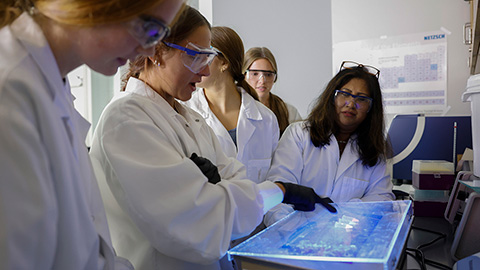
How AlphaFold transformed my classroom into a research lab
A high school science teacher reflects on how AI-integrated technologies help her students ponder realistic research questions with hands-on learning.
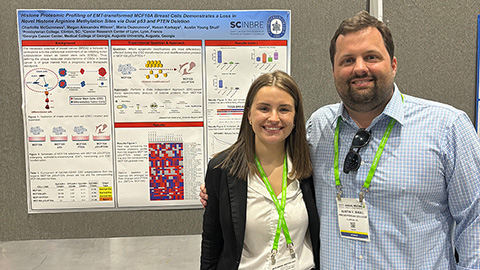
Writing with AI turns chaos into clarity
Associate professor shares how generative AI, used as a creative whiteboard, helps scientists refine ideas, structure complexity and sharpen clarity — transforming the messy process of discovery into compelling science writing.

How undergrad research catalyzes scientific careers
Undergraduate research doesn’t just teach lab skills, it transforms scientists. For Antonio Rivera and Julissa Cruz–Bautista, joining a lab became a turning point, fostering critical thinking, persistence and research identity.

Talk nerdy to me: Communicating research that matters
Master science communication: learn to engage the public, work with the press and explore new careers — from consulting to media — through ASBMB’s Art of Science Communication course.

